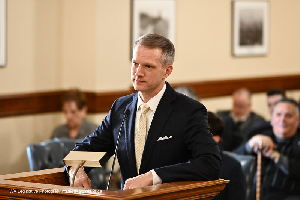Business News of Sunday, 29 June 2025
Source: www.punchng.com
New tax reforms: Remote workers’ foreign earnings now taxable
The new tax reform acts, which were recently signed into law by President Bola Tinubu, have brought the earnings of remote workers in Nigeria within the tax bracket.
Under the new provisions, individuals who work for foreign clients or companies, including freelancers, tech professionals, and digital entrepreneurs, are required to register with their state tax authorities, declare their foreign earnings in naira, and pay the appropriate taxes, just like every other Nigerian income earner.
The COVID-19 pandemic catalysed the transition to remote work. In mid-2021, nearly 70 per cent of companies in sectors like tech and finance adopted some form of remote or hybrid model, according to McKinsey, and the World Economic Forum has projected that there will be 92 million remote jobs by 2030.
PwC, a multinational professional services network, known for its audit, assurance, tax, and advisory services, in their analysis of the new taxes, stated that Personal Income Tax “will apply to the worldwide income of a resident individual, which is now clearly defined in the new Act.
“Prior to now, there had been varied interpretations due to a lack of proper definition of ‘residence.’ With the definition extending to individuals with substantial economic and immediate family ties in a year of assessment, the law widens the tax net.
“Employment income will now be taxed in Nigeria only if the individual is resident in Nigeria or performs duties in Nigeria without paying tax in their country of residence.”
On his part, a financial consultant, Feji Iyeke, noted that the days of remote workers being able to go tax-free were numbered.
Iyeke, who is popularly known as @your_moneyguy on social media, revealed to The PUNCH that the reform signals the end of a long-standing grey area in Nigeria’s tax framework, where income from platforms like Payoneer, Wise, and Barter often went unreported.
With increased cooperation through international tax treaties and enhanced digital monitoring, such inflows will be visible to the new Nigeria Revenue Service and Central Bank.
He said, “Now, to remote workers and digital hustlers, you work from Lagos, earn $3,000/month from a US company? The new law says you must register with the state tax authority, declare your income in naira and pay tax like every Nigerian earner.”
Disabusing remote workers of the notion of deceit, Iyeke said, “If your Payoneer/Wise/Barter account is linked to your BVN or Nigerian bank, your foreign inflow is already visible. FIRS and CBN can track it…quietly.
“Thanks to international tax treaties, even your US or UK employer may report income paid to you. If your client or boss is in a ‘compliant country,’ Nigeria can get your income info automatically. The days of ‘nobody fit know’ are counting down.”
This move is set to affect a lot of Nigerians who work remotely for international firms and earn in foreign currency. The revenue from taxes on remote work may even be higher, considering the move by the Federal Government to liaise with other countries to provide remote work opportunities for Nigerian youths.
At the KPMG budget 2025 day earlier this year, the Minister of Budget and Economic Planning, Atiku Bagudu, said Nigeria is open to the idea of supplying talent to other countries as a source of providing jobs for its teeming population.
He said, “We are engaging with many countries in order to see how legitimately our young ones can provide outsourcing services from where they are and can participate in business processing. We have seen demand for software engineers from different countries. The Japanese ambassador told me that Nigeria is the first call for Japanese companies now seeking software engineers.”
Nigeria is home to one of Africa’s largest youth populations, even as the National Bureau of Statistics said that the country’s unemployment rate dropped to 4.3 per cent in the second quarter of 2024 from 5.3 per cent in Q1.
The Nigeria Labour Force Survey indicated that the labour force participation rate among the working-age population increased to 79.5 per cent in Q2 2024 from 77.3 per cent in Q1 2024.
In the aftermath of the signing of the bills, the Chairman of the Presidential Committee on Fiscal Policy and Tax Reforms, Mr Taiwo Oyedele, revealed that tax evasion was going to be harder to do now.
He said, “We are going to digitise everything now. There is a new name now, from FIRS to NRS, and that revenue service will now work with sub-nationals. If you live in Ekiti State, you can’t go and tell them that you live in FCT when you are not. That lie happens every day in Nigeria.
“We will find out that the system will show it. You know your phone can tell us where you are. So data will tell us who is truly poor, and we will protect them and exempt them from paying taxes. It is pro-poor, pro-business, and pro-growth and equity, and fairness.”












